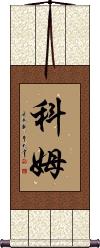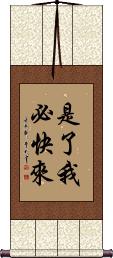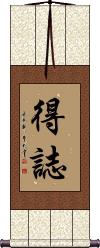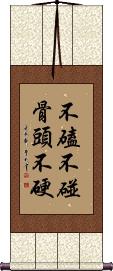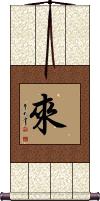Many custom options...
And formats...

Come in Chinese / Japanese...
Buy a Come calligraphy wall scroll here!
Personalize your custom “Come” project by clicking the button next to your favorite “Come” title below...
1. Come
3. Dream Come True / Enjoy Success
4. Strong bones come from hard knocks
Come
Surely I come quickly
Part of Revelation 22:20
是了我必快來 is an excerpt from Revelations 22:20. It says “Surely, I am coming quickly” or “Surely I come quickly” depending on which Bible translation you use.
The Chinese translation here comes from the Chinese Union Bible which has been around for almost 100 years and is the standard for Chinese Christians.
Dream Come True / Enjoy Success
Strong bones come from hard knocks
不磕不碰骨頭不硬 is a Chinese proverb that literally translates as: Without being knocked around a bit, [one's] bones won't become hard.
Figuratively, this means: One can't become strong without first being tempered by “hard knocks.”
While true for everyone, this sounds like the “Iron Body” form of Kung Fu, where practitioners' bodies are beaten (and often bone fractured) in order to become stronger.
For the rest of us, this is just about how we can be tempered and build character through the hardships in our lives.
This is not a common title for a wall scroll in China.
Even a fool may sometimes come up with a good idea
千慮一得 means “1000 tries, one success,” or “[a] thousand tries [leads to] one success.”
This proverb is a humble way to express your success, ideas, or accomplishments. As if you are a fool who just got lucky in inventing or creating something.
Translations for this proverb include:
Even without any notable ability on my part, I may still get it right sometimes by good luck.
Even a fool may sometimes come up with a good idea.
Compare this to the English idiom, “Even a broken clock is right twice a day.”
To Come / To Arrive
來 means to come or to arrive.
In Japanese, this can be the female given name Rai or the surnames Takagi or Kuru (and a few other rare names). Often written 来 instead of the original 來 in modern Japanese.
In the Buddhist context, this can mean the coming or refer to the future.
These search terms might be related to Come:
Autumn / Fall Season
Each Time You Stumble and Fall, You Gain Experience and Wisdom
Even Monkeys Fall From Trees
Fall Down Seven Times, Get Up Eight
Flowers Bloom and Flowers Fall
Flowers Fall / the End Comes
Go Kan Ryu
Go With the Flow
Go-Dan / 5th Degree Black Belt
Pride Goes Before a Fall
Reach Peace and Calm Through Meditation
Release / Let Go
Rise and Fall / Ups and Downs
The Game of Weiqi / Weichi / Go
To Come / to Arrive
Not the results for Come that you were looking for?
Below are some entries from our dictionary that may match your Come search...
| Characters If shown, 2nd row is Simp. Chinese |
Pronunciation Romanization |
Simple Dictionary Definition |
來 来 see styles |
lái lai2 lai rai らい |
More info & calligraphy: To Come / To Arrive(female given name) Rai āgama; āgam-; āgata. Come, the coming, future. |
僧 see styles |
sēng seng1 seng sou / so そう |
More info & calligraphy: Sangha / Order of Monks(1) monk; priest; (2) (abbreviation) (See 僧伽・そうぎゃ) sangha (the Buddhist community); (surname) Sou 僧伽 saṅgha, an assembly, collection, company, society. The corporate assembly of at least three (formerly four) monks under a chairman, empowered to hear confession, grant absolution, and ordain. The church or monastic order, the third member of the triratna. The term 僧 used alone has come to mean a monk, or monks in general. Also僧佉, 僧加, 僧企耶.; A fully ordained monk, i.e. a bhikṣu as contrasted with the śramaņa. |
空 see styles |
kòng kong4 k`ung kung ron ろん |
More info & calligraphy: Sky / Ether / Void / Emptiness / Unreality(1) empty air; sky; (2) {Buddh} shunyata (the lack of an immutable intrinsic nature within any phenomenon); emptiness; (3) (abbreviation) (See 空軍) air force; (noun or adjectival noun) (4) fruitlessness; meaninglessness; (noun or adjectival noun) (5) (See 五大・1) void (one of the five elements); (can be adjective with の) (6) {math} empty (e.g. set); (female given name) Ron śūnya, empty, void, hollow, vacant, nonexistent. śūnyatā, 舜若多, vacuity, voidness, emptiness, non-existence, immateriality, perhaps spirituality, unreality, the false or illusory nature of all existence, the seeming 假 being unreal. The doctrine that all phenomena and the ego have no reality, but are composed of a certain number of skandhas or elements, which disintegrate. The void, the sky, space. The universal, the absolute, complete abstraction without relativity. There are classifications into 2, 3, 4, 6, 7, 11, 13, 16, and 18 categories. The doctrine is that all things are compounds, or unstable organisms, possessing no self-essence, i.e. are dependent, or caused, come into existence only to perish. The underlying reality, the principle of eternal relativity, or non-infinity, i.e. śūnya, permeates all phenomena making possible their evolution. From this doctrine the Yogācārya school developed the idea of the permanent reality, which is Essence of Mind, the unknowable noumenon behind all phenomena, the entity void of ideas and phenomena, neither matter nor mind, but the root of both. |
靈 灵 see styles |
líng ling2 ling ryō |
More info & calligraphy: Spirit / SoulSpirit, spiritual, energy, effective, clever. |
如來 如来 see styles |
rú lái ru2 lai2 ju lai nyorai にょらい |
More info & calligraphy: Tathagata(out-dated kanji) Tathagata; perfected one (suffix of high-ranking Buddhist deities) tathāgata, 多陀阿伽陀 q. v.; 怛他揭多 defined as he who comes as do all other Buddhas; or as he who took the 眞如 zhenru or absolute way of cause and effect, and attained to perfect wisdom; or as the absolute come; one of the highest titles of a Buddha. It is the Buddha in his nirmāṇakāya, i. e. his 'transformation' or corporeal manifestation descended on earth. The two kinds of Tathāgata are (1) 在纏 the Tathāgata in bonds, i. e. limited and subject to the delusions and sufferings of life, and (2) 出纏 unlimited and free from them. There are numerous sutras and śāstras bearing this title of 如來 rulai. |
布施 see styles |
bù shī bu4 shi1 pu shih fuho ふほ |
More info & calligraphy: Dana: Almsgiving and Generosity(n,vs,vi) (1) {Buddh} alms-giving; charity; (n,vs,vi) (2) {Buddh} offerings (usu. money) to a priest (for reading sutras, etc.); (surname) Fuho dāna 檀那; the sixth pāramitā, almsgiving, i. e. of goods, or the doctrine, with resultant benefits now and also hereafter in the forms of reincarnation, as neglect or refusal will produce the opposite consequences. The 二種布施 two kinds of dāna are the pure, or unsullied charity, which looks for no reward here but only hereafter; and the sullied almsgiving whose object is personal benefit. The three kinds of dāna are goods, the doctrine, and courage, or fearlessness. The four kinds are pens to write the sutras, ink, the sutras themselves, and preaching. The five kinds are giving to those who have come from a distance, those who are going to a distance, the sick, the hungry, those wise in the doctrine. The seven kinds are giving to visitors, travellers, the sick, their nurses, monasteries, endowments for the sustenance of monks or nuns, and clothing and food according to season. The eight kinds are giving to those who come for aid, giving for fear (of evil), return for kindness received, anticipating gifts in return, continuing the parental example of giving, giving in hope of rebirth in a particular heaven, in hope of an honoured name, for the adornment of the heart and life. 倶舍論 18. |
得誌 得志 see styles |
dé zhì de2 zhi4 te chih |
More info & calligraphy: Dream Come True / Enjoy SuccessSee: 得志 |
復活 复活 see styles |
fù huó fu4 huo2 fu huo fukkatsu(p); fukkaatsu(sk) / fukkatsu(p); fukkatsu(sk) ふっかつ(P); ふっかーつ(sk) |
More info & calligraphy: Resurrection / Re-Birth(n,vs,vt,vi) (1) revival (of an old system, custom, fashion, etc.); restoration; return; comeback; (n,vs,vi) (2) resurrection; rebirth To live again, return to life. |
省悟 see styles |
xǐng wù xing3 wu4 hsing wu seigo / sego せいご |
More info & calligraphy: Wake Up to Reality(given name) Seigo to reflect and become aware |
醒悟 see styles |
xǐng wù xing3 wu4 hsing wu |
More info & calligraphy: Reality |
あんす see styles |
ansu アンス |
(expression) (1) (archaism) (semi-polite) to come; to go; (auxiliary verb) (2) (polite language) (archaism) (after -masu stem of verb) (See ます・1) expresses politeness towards the listener (or reader); (surname) Hains |
カモン see styles |
gamon ガモン |
More info & calligraphy: Kamon |
正精進 正精进 see styles |
zhèng jīng jìn zheng4 jing1 jin4 cheng ching chin shoushoujin / shoshojin しょうしょうじん |
More info & calligraphy: 6. Right Effort / Right Endeavor / Perfect Effortsamyagvyāyāma, right effort, zeal, or progress, unintermitting perseverance, the sixth of the 八正道; 'right effort, to suppress the rising of evil states, to eradicate those which have arisen, to stimulate good states, and to perfect those which have come into being. ' Keith. |
生きる see styles |
ikiru いきる |
More info & calligraphy: Ikiru / To Live |
千慮一得 千虑一得 see styles |
qiān lǜ yī dé qian1 lu:4 yi1 de2 ch`ien lü i te chien lü i te senryoittoku; senryonoittoku せんりょいっとく; せんりょのいっとく |
More info & calligraphy: Even a fool may sometimes come up with a good idea(expression) (yoji) even a fool may sometimes come up with a good idea |
さ see styles |
za ザ |
(suffix) (1) (nominalizing suffix indicating degree or condition) -ness; (particle) (2) (sentence end, mainly masc.) indicates assertion; (interjection) (3) (See さあ・1) come; come now; (personal name) Zsa |
ね see styles |
ne ね |
(particle) (1) indicates emphasis, agreement, request for confirmation, etc.; is it so; (interjection) (2) hey; come on; listen; (auxiliary adjective) (3) (colloquialism) not |
入 see styles |
rù ru4 ju kaeru かえる |
to enter; to go into; to join; to become a member of; (bound form) to conform to (as in 入時|入时[ru4shi2]); abbr. for 入聲|入声[ru4sheng1]; (on product packaging, after {number n} + {classifier}) containing (n pieces) (from Japanese 入 "iri") (suf,ctr) (archaism) counter for soakings (of fabric in a dye); (surname) Kaeru To enter, entry, entrance; come, bring or take in; at home; awaken to the truth; begin to understand; to relate the mind to reality and thus evolve knowledge. |
出 see styles |
chū chu1 ch`u chu de で |
to go out; to come out; to arise; to occur; to produce; to yield; to go beyond; to exceed; (used after a verb to indicate an outward direction or a positive result); classifier for dramas, plays, operas etc (n,n-suf) (1) coming out; going out; outflow; efflux; rising (of the Sun or the Moon); (n,n-suf) (2) attending (work); appearing (on stage); one's turn to go on; (n,n-suf) (3) start; beginning; (n,n-suf) (4) origins; background; person (or item) originating from ...; graduate of ...; native of ...; member of ... (lineage); (n,n-suf) (5) architectural member that projects outward; (n,n-suf) (6) highest point of the stern of a ship; (n,n-suf) (7) (kana only) (usu. after the -masu stem of a verb as 〜出がある or 〜出がない, etc.) amount (comprising something); amount of time or effort required to do something; (surname) De To go out, come forth, put forth; exit; beyond. |
即 see styles |
jí ji2 chi chikashi ちかし |
namely; that is; i.e.; prompt; at once; at present; even if; prompted (by the occasion); to approach; to come into contact; to assume (office); to draw near (adv,pref) (1) instantly; immediately; at once; (conjunction) (2) (usu. in negative sentence) equals; means; is; (3) {Buddh} oneness (of two opposing things); inseparability; (given name) Chikashi |
対 see styles |
duì dui4 tui tsuizaki ついざき |
Japanese variant of 對|对[dui4] (1) pair; couple; set; (2) (See 対句) antithesis; (counter) (3) counter for items that come in pairs; (counter) (4) counter for sets (of clothes, small furniture, utensils, etc.); (surname) Tsuizaki |
廢 废 see styles |
fèi fei4 fei hai |
to abolish; to abandon; to abrogate; to discard; to depose; to oust; crippled; abandoned; waste To fall in ruins; come to nought; cast aside, do away with, discard; spoil, waste. |
惺 see styles |
xīng xing1 hsing sei / se せい |
(literary) to come to one's senses; to awaken; (literary) astute; sharp-witted (given name) Sei |
敪 see styles |
duó duo2 to |
to weigh; to cut; to come without being invited |
格 see styles |
gé ge2 ko wataru わたる |
square; frame; rule; (legal) case; style; character; standard; pattern; (grammar) case; (classical) to obstruct; to hinder; (classical) to arrive; to come; (classical) to investigate; to study exhaustively (hist) (See 律令) amendment (to ritsuryō); (given name) Wataru A rule, line, pattern; reach, research, science. |
熄 see styles |
xī xi1 hsi |
to extinguish; to put out (fire); to quench; to stop burning; to go out (of fire, lamp etc); to come to an end; to wither away; to die out; Taiwan pr. [xi2] |
省 see styles |
xǐng xing3 hsing mitsumu みつむ |
(bound form) to scrutinize; (bound form) to reflect (on one's conduct); (bound form) to come to realize; (bound form) to pay a visit (to one's parents or elders) (n,n-suf) (1) ministry; department; (n,n-suf) (2) province (of China); (prefix noun) (3) (See 省スペース) saving; conserving; (female given name) Mitsumu Look into minutely, inspect, examine; arouse; spare, save; an inspectorate, hence a province. |
逢 see styles |
féng feng2 feng ai あい |
to meet by chance; to come across; (of a calendar event) to come along; (of an event) to fall on (a particular day); to fawn upon (female given name) Ai |
遒 see styles |
qiú qiu2 ch`iu chiu takashi たかし |
strong; vigorous; robust; to draw near; to come to an end (personal name) Takashi |
醒 see styles |
xǐng xing3 hsing sumitomo すみとも |
to wake up; to be awake; to become aware; to sober up; to come to (personal name) Sumitomo awaken |
Click here for more Come results from our dictionary
The following table may be helpful for those studying Chinese or Japanese...
| Title | Characters | Romaji (Romanized Japanese) | Various forms of Romanized Chinese | |
| Come | 科姆 | kē mǔ / ke1 mu3 / ke mu / kemu | k`o mu / komu / ko mu | |
| Surely I come quickly | 是了我必快來 是了我必快来 | shì le wǒ bì kuài lái shi4 le wo3 bi4 kuai4 lai2 shi le wo bi kuai lai shilewobikuailai | shih le wo pi k`uai lai shihlewopikuailai shih le wo pi kuai lai |
|
| Dream Come True Enjoy Success | 得誌 得志 | dé zhì / de2 zhi4 / de zhi / dezhi | te chih / techih | |
| Strong bones come from hard knocks | 不磕不碰骨頭不硬 不磕不碰骨头不硬 | bù kē bù pèng gǔ tóu bù yìng bu4 ke1 bu4 peng4 gu3 tou2 bu4 ying4 bu ke bu peng gu tou bu ying bukebupenggutoubuying | pu k`o pu p`eng ku t`ou pu ying pukopupengkutoupuying pu ko pu peng ku tou pu ying |
|
| Even a fool may sometimes come up with a good idea | 千慮一得 千虑一得 | senryonoittoku | qiān lǜ yī dé qian1 lv4 yi1 de2 qian lv yi de qianlvyide | ch`ien lü i te chienlüite chien lü i te |
| To Come To Arrive | 來 来 | rai / takagi / kuru | lái / lai2 / lai | |
| In some entries above you will see that characters have different versions above and below a line. In these cases, the characters above the line are Traditional Chinese, while the ones below are Simplified Chinese. | ||||
Successful Chinese Character and Japanese Kanji calligraphy searches within the last few hours...
